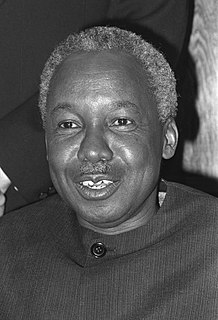Top 25 Quotes & Sayings by Julius Nyerere
Explore popular quotes and sayings by a Tanzanian politician Julius Nyerere.
Last updated on April 14, 2025.
Unity will not make us rich, but it can make it difficult for Africa and the African peoples to be disregarded and humiliated. And it will, therefore, increase the effectiveness of the decisions we make and try to implement for our development. My generation led Africa to political freedom. The current generation of leaders and peoples of Africa must pick up the flickering torch of African freedom, refuel it with their enthusiasm and determination, and carry it forward.
Having come into contact with a civilization which has over-emphasized the freedom of the individual, we are in fact faced with one of the big problems of Africa in the modern world. Our problem is just this: how to get the benefits of European society - benefits that have been brought about by an organization based upon the individual - and yet retain African's own structure of society in which the individual is a member of a kind of fellowship.
When we were at school we were taught to sing the songs of the Europeans. How many of us were taught the songs of the Wanyamwezi or of the Wahehe? Many of us have learnt to dance the rumba, or the cha cha, to rock and roll and to twist and even to dance the waltz and foxtrot. But how many of us can dance, or have even heard of the gombe sugu, the mangala, nyang umumi, kiduo, or lele mama?


















